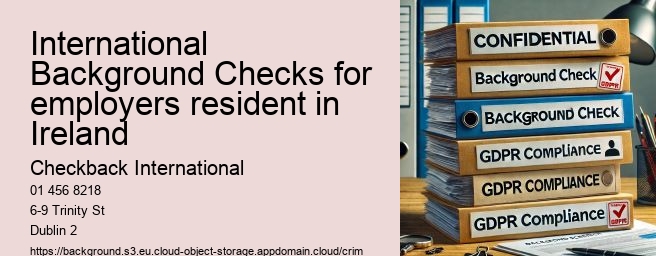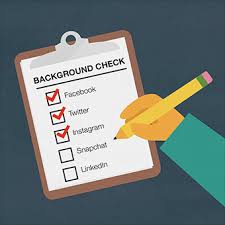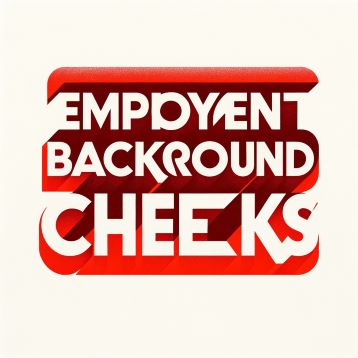

A. standards and other industry requirements, making them valuable for Irish businesses. Different Types of Background ChecksDifferent Types of Background ChecksCompanies conduct various background checks in Ireland to determine if candidates match their job requirements. Garda National Vetting Bureau European Cross Border checks need additional time, especially for people who lived in multiple countries.
Digital application forms and virtual document verification help process candidate details, while algorithms find inconsistencies. Different industries require varying levels and types of background checks.
The process takes 5 to 10 working days for candidate verification across borders, with options for faster processing. The specific requirements depend on security needs, regulation requirements, and potential liability risks within each sector.
Candidates who find errors in their background report should contact the issuing agency and submit proof that challenges any incorrect information. Legal Framework for Background Checks The legal framework for employee background checks in Ireland operates under the General Data Protection Regulation (GDPR) and the Data Protection Acts.
Types of Background Checks Required in IrelandIn Ireland's security and employment sectors, several specific types of background checks are required by the Private Security Authority (PSA). Employment History and Reference ChecksEmployment history and reference checks are part of Ireland's background screening process. Background checks for employment do not generally disclose medical history or health information without specific authorization.
Credit History Check: This reviews the candidate's financial history, particularly for positions in the finance sector.5. Understanding PSA vetting standards remains necessary for security operations and meeting regulations.
Background checks can be done in Ireland, following GDPR and the Data Protection Acts 1988-2018. Organizations keep secure storage systems with appropriate access controls and data encryption measures.3.
Background Checks IrelandIn Ireland, background checks are part of the recruitment process, including the European Criminal Record Check (ECRC). For security personnel, mandatory five-year background screenings maintain PSA standards.

Reports must include verification from national authorities like Garda, DBS, and Department of Justice.3. This quick service matters in industries needing rapid staffing decisions. What Specific Information Is Required From Candidates for Vetting?
Timeframes and Processing PeriodsBackground checks in Ireland follow standardized processing periods that change based on the type and scope of verification needed. Being open and truthful about one's background prevents future job problems or disqualification.
Background checks in Ireland operate under the Private Security Authority (PSA) regulation through the Private Security Services Act 2004. The tools have improved the speed, accuracy, and transparency of background checks in Ireland.
Staff will contact candidates to obtain missing details or get clarification about information that cannot be verified. When candidates refuse pre-employment vetting, employers may withdraw the job offer or end the recruitment process.
This method makes the verification process simple for clients through a unified criminal background review of potential employees across Europe. This shift to digital methods improves vetting speed and security. Companies must follow legal requirements and get clear consent before doing background checks.
They provide comprehensive background checks for businesses across Ireland and Europe, verifying that candidates meet workplace security and integrity standards.1. In Ireland, data provided during background checks has strong security protections.
Other standards include PSA 39:2014 for event security and PSA 55:2016 for locksmiths. Standard turnaround times for European background checks range from 5-10 working days.2.
The process includes obtaining references from previous employers and personal character references from non-family members. The process checks consumer credit through registered and unregistered judgments, plus database searches of courts and company records.

Common Mistakes and How to Avoid ThemPSA vetting maintains high standards within the security sector, yet mistakes can compromise the process. The background checks must cover a five-year history period or start from when the person left secondary education, whichever occurred more recently. Organizations can speed up the process when candidates submit complete information and quickly provide any additional documents requested by vetting agencies.
The verification system shows key information about candidate suitability. Importance of Compliance in Employee Screening Maintaining legal standards during employee screening is a regulatory requirement in Ireland and a key part of reliable hiring practices.
The assessment includes registered and unregistered judgments, with data sourced directly from Courts and Companies Office records. This confirms candidates meet the standards for airside access while maintaining operational efficiency during screening.
For regulated sectors, fitness and probity assessments occur with the Central Bank and other inspectorates. Organizations like Checkback International Services and Executive Vetting Solutions conduct thorough reviews of potential employees' histories.

Financial Institutions: Better vetting helps prevent fraud and keeps customer data safe.3. Biometric Screening Steps in the PSA Background Check ProcessThe PSA background check process starts when companies collect required information from potential employees, including full names, dates of birth, and addresses. Data protection regulations allow candidates to request copies of their background screening reports.
Most employers conduct these checks on job candidates who are old enough to work legally in their jurisdiction. Organizations can expect varied expenses based on their requirements for each candidate.
Organizations must follow both EU-wide data protection legislation and country-specific privacy requirements. Are International Qualifications Verified Differently From Irish Qualifications?
The process lets applicants and companies move forward with cross-border hiring without long delays in recruitment. Users often point out the helpfulness of service teams and their quick response to questions.

Education Verification: This authenticates a candidate's educational qualifications from known institutions.4. Consumer credit reports contain bankruptcy information, directorship history, and date of birth verification, with results delivered within 24 to 48 hours. The first stage requires candidates to fill out a central European form, regardless of the number of EU states where they lived.
Background check requirements stay the same for both temporary and permanent positions. They are a key part of the screening process, particularly for positions involving financial decisions or handling money.
Checkback International's data protection practices include work with European inspectorates and credit agencies, maintaining compliance across all jurisdictions where background checks occur. Call the office at +353 (0) 1456-8218.
Price: Good service at reasonable rates matters. The agencies typically have specific processes and time limits for reviewing and fixing wrong information.

No, background checks do not affect your credit score as they do not involve a credit inquiry that would impact the score.
A background check in Ireland involves reviewing a person's criminal, financial, or personal records to assess their suitability for a role or position.
Information about spent convictions, certain types of personal data, and other protected characteristics under GDPR is off-limits unless specifically relevant and lawful to access.
Handling involves assessing the relevance to the job, discussing findings with the candidate, and considering legal and ethical implications.
Signs include transparency about services, compliance with legal standards, positive reviews, and strong data protection practices.
While not specific by law, many IT positions require checks due to access to sensitive or proprietary information.
It depends on the industry and role, but typically every 2-3 years or when significant changes occur in the individual’s role or responsibility.